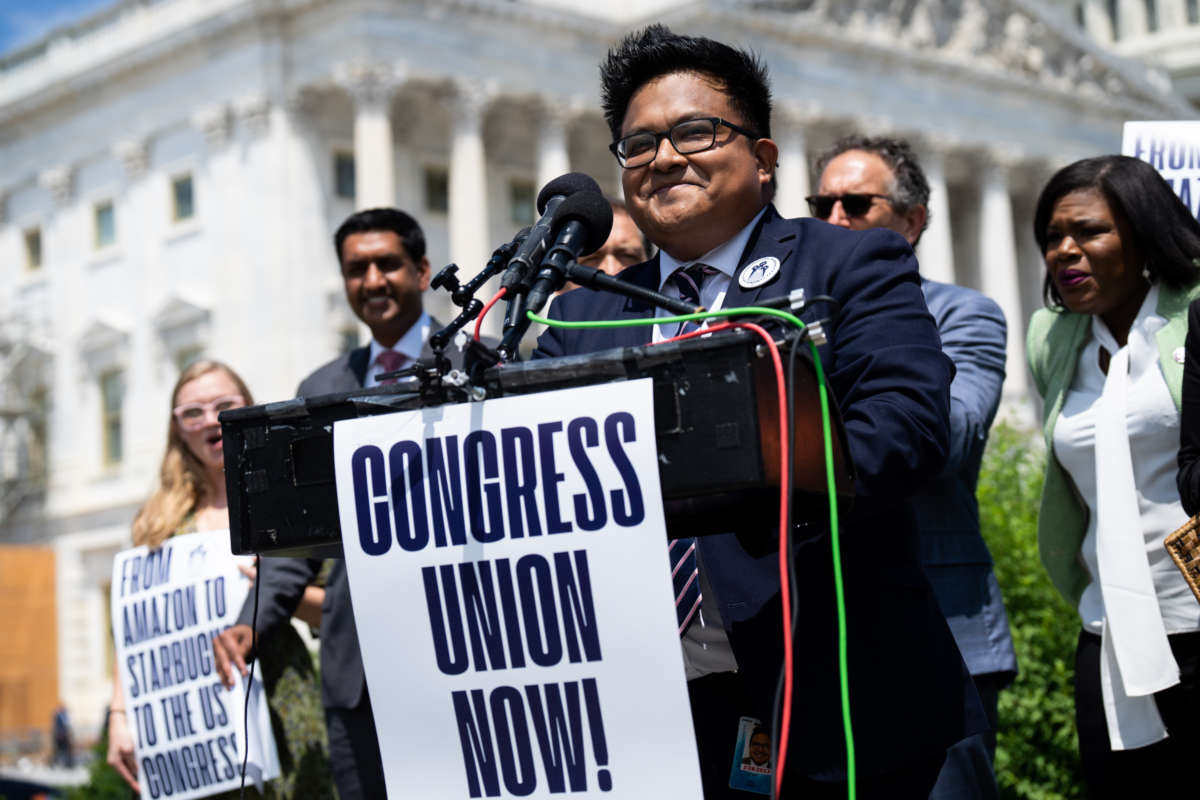The Congressional Workers Union celebrated on Thursday as House staffers began voting on whether or not to form the first-ever union within Congress, a right that was granted to congressional staffers earlier this year by House lawmakers.
Staffers in Rep. Andy Levin’s (D-Michigan) office will be voting electronically on whether or not to unionize on Thursday and Friday. Levin was an original sponsor of the resolution that allowed staffers to unionize and granted them related labor protections; the resolution activated decades-old legislation outlining congressional workers’ right to form unions.
“This is a historic and momentous day for both the labor movement and democracy, as we watch a union election play out for the first time in a congressional office in the history of the U.S. Congress,” the union wrote in a press release.
If a majority of staffers vote “yes” on the union, they will be the first office in congressional history to unionize. The union will be short-lived, however, as Levin was defeated in his primary in August after moneyed interests like the American Israel Public Affairs Committee (AIPAC) and corporate groups spent millions of dollars on his ousting.
However, there may be several other congressional unions that will survive Levin’s, if the vote succeeds. At least seven other offices have filed to unionize so far, including the offices of Representatives Cori Bush (Missouri), Chuy García (Illinois), Ro Khanna (California), Ted Lieu (California), Alexandria Ocasio-Cortez (New York), Ilhan Omar (Minnesota) and Melanie Stansbury (New Mexico).
Though it’s unclear whether or not these offices will, indeed, vote to unionize, nearly all of the lawmakers whose offices will soon be voting have spoken out in support of the union.
“I am so proud of the staffers who made a historic move today,” said Levin in a statement in July, when his office filed a union petition. “It is the workers who ensure that this institution — the bedrock of our fragile and precious democracy — operates efficiently and serves the American people here in the Capitol and in every corner of our nation.”
Once they form a union, workers will be able to negotiate pay and benefits like student loan repayment aid or parental leave, according to Demand Progress.
Though there are Senate workers involved in the union, the chamber has not voted on the corresponding Senate resolution to activate their staffers’ right to unionize, and would likely reject the resolution if it came to a vote thanks to opposition from Republicans and conservative Democrats like Sen. Joe Manchin (West Virginia).
Congressional staffers have long reported poor working conditions in both their offices and the halls of Congress at large. Workers face low pay and often struggle to pay for necessities like child care, while other workers of their caliber are often offered private sector jobs that pay far better, like those in the lobbying sector, for instance.
Non-white workers have it the worst. Research has found that non-white staffers working for lawmakers in both major parties are paid an average of $5,600 less a year in the House and $9,100 less in the Senate. This — and the racist abuse that non-white staffers often face — could be part of the reason why there are so few non-white staffers on Capitol Hill.
When it comes to the union effort, on the other hand, non-white workers have been at the forefront of the movement.
Organizers with the Congressional Workers Union have also been involved in other activist efforts in Congress in recent months. This summer, several organizers within the union participated in a protest in Sen. Chuck Schumer’s (D-New York) office, urging him and President Joe Biden to take action on the climate crisis after Manchin threw cold water on climate-related negotiations in July.
We’re not backing down in the face of Trump’s threats.
As Donald Trump is inaugurated a second time, independent media organizations are faced with urgent mandates: Tell the truth more loudly than ever before. Do that work even as our standard modes of distribution (such as social media platforms) are being manipulated and curtailed by forces of fascist repression and ruthless capitalism. Do that work even as journalism and journalists face targeted attacks, including from the government itself. And do that work in community, never forgetting that we’re not shouting into a faceless void – we’re reaching out to real people amid a life-threatening political climate.
Our task is formidable, and it requires us to ground ourselves in our principles, remind ourselves of our utility, dig in and commit.
As a dizzying number of corporate news organizations – either through need or greed – rush to implement new ways to further monetize their content, and others acquiesce to Trump’s wishes, now is a time for movement media-makers to double down on community-first models.
At Truthout, we are reaffirming our commitments on this front: We won’t run ads or have a paywall because we believe that everyone should have access to information, and that access should exist without barriers and free of distractions from craven corporate interests. We recognize the implications for democracy when information-seekers click a link only to find the article trapped behind a paywall or buried on a page with dozens of invasive ads. The laws of capitalism dictate an unending increase in monetization, and much of the media simply follows those laws. Truthout and many of our peers are dedicating ourselves to following other paths – a commitment which feels vital in a moment when corporations are evermore overtly embedded in government.
Over 80 percent of Truthout‘s funding comes from small individual donations from our community of readers, and the remaining 20 percent comes from a handful of social justice-oriented foundations. Over a third of our total budget is supported by recurring monthly donors, many of whom give because they want to help us keep Truthout barrier-free for everyone.
You can help by giving today. Whether you can make a small monthly donation or a larger gift, Truthout only works with your support.
